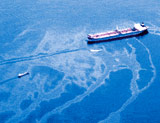| A federal appeals court on Friday cut in half a $5 billion jury award for punitive damages against Exxon Mobil Corp. in the 1989 Valdez oil spill that smeared black goo across roughly 1,500 miles of Alaskan coastline. The case, one of the nation's longest-running, non-criminal legal disputes, stems from a 1994 decision by an Anchorage jury to award the punitive damages to 34,000 fishermen and other Alaskans. Their property and livelihoods were harmed when the Valdez oil tanker struck a charted reef, spilled 11 million gallons of crude oil. It's the third time the appeals court ordered the Anchorage court to reduce the $5 billion award, the nation's largest at the time, saying it was unconstitutionally excessive in light of U.S. Supreme Court precedent. This time, in its 2-1 decision, the court ordered a specific amount in damages, while its previous rulings demanded a lower court to come up with its own figures. "It is time for this protracted litigation to end," the court said. U.S. District Judge H. Russel Holland of Anchorage begrudgingly complied in 2002, reducing damages to $4 billion. Irving, Texas-based Exxon again appealed. The following year, the appeals court ordered Holland to revisit his decision, this time balancing it against a new 2003 Supreme Court ruling that said punitive damages usually could not be more than nine times general damages. The Anchorage jury awarded $287 million in general damages -- and issued punitive damages that were 17 times that amount. Holland, appointed by President Reagan in 1984, declared Exxon's conduct "reprehensible" and set the figure at $4.5 billion plus interest, ruling that the Supreme Court's precedent did not directly apply to the case. Exxon again appealed, and argued that it should have to pay no more than $25 million in punitive damages, which are meant to punish a company for misconduct. The company, whose $36.1 billion in earnings last year were the highest ever by any U.S. corporation, said it has spent more than $3 billion to settle federal and state lawsuits and to clean the Prince William Sound area. The company earned about $5 billion when the spill occurred. In October, Exxon Mobil reported earnings of $10.49 billion in the third quarter, the second-largest quarterly profit ever recorded by a publicly traded U.S. company. In 1994, a federal jury found recklessness by Exxon and the captain of the Valdez, Joseph Hazelwood, who caused the tanker to run aground. That finding of malfeasance made Exxon liable for punitive damages. The plaintiffs alleged Hazelwood ran the ship into a reef while drunk and Exxon knew he had a drinking problem, but left him in command of tankers. |





